Indigenous students

Boozhoo, shé:kon, waachi'ye, tansi, aanii, tungasugiit, tawnshi, greetings!
At Waterloo, you’ll find resources and opportunities for Indigenous students, from weekly meetups and scholarships, and more.
Scholarships
Waterloo offers scholarships ranging from $1,200 to $40,000 for new First Nations, Inuit, and Métis students.
- Entrance scholarships for Indigenous students →
- Entrance scholarships available to all students →
- Earn money and experience through Waterloo's co-op program →
Financial waivers for Indigenous students
Waterloo is committed to addressing the goals of truth and reconciliation and removing or reducing the financial barriers of attending university.
Tuition waivers for Indigenous students
Waterloo is committed to addressing the goals of Truth and Reconciliation and removing or reducing the financial barriers of attending university.
- We waive tuition fees for Waterloo students who are members of the Mississaugas of the Credit First Nation or Six Nations of the Grand River (on whose traditional territory the University of Waterloo is situated).
- Students will still need to pay incidental fees (e.g., health plan, student government, athletics and recreation, student support services) which can range from $900 to $2,000 per term, depending on your program and whether you're in co-op.
- First Nations, Métis, and Inuit students from Canadian provinces and territories outside Ontario can pay the lower tuition rate for Ontario students.
- Native American students from the continental U.S. as recognized by the Jay Treaty are also eligible for Ontario tuition rates instead of international student tuition.
Defer your residence deposit
Enjoy the benefits of living on campus with our residence guarantee for first-year and transfer students.
Incoming first-year students who complete the Indigenous citizenship/membership verification process and complete the residence application by the deadline in June can choose to defer the $500 deposit for on-campus residence. Instead of paying the deposit by the residence application deadline in June, the deposit will be included in the fall term residence fees you'll pay in August.
How it works
- Once you've applied to Waterloo, you can declare your Indigenous citizenship/membership as a First Nation (Status or Non-Status), Inuit, or Métis person.
- We recommend doing this by April 15 to allow time to apply by the residence deadline in June.
- If you receive an offer of admission after April 15, we encourage you to complete this process right away.
- We'll email eligible students in mid-May with instructions on how to bypass the deposit and secure your housing on campus.
If you have some questions about the deferred residence deposit or eligibility, please contact housing@uwaterloo.ca.
You can also read more about the Indigenous citizenship/membership verification process.
Life at Waterloo

Celebrate
Enjoy Soup and Bannock lunches and drumming circles organized through the Indigenous Student Services plus events such as the annual Pow Wow and Indigenous speaker series.

Reflect
The Ceremonial Fire Grounds and Medicine Garden and the beautiful new Indigenous Outdoor Gathering Space offer sacred spaces for individual use, gatherings, and education.

Feel at home
Be part of our close-knit Indigenous residence community, located at United College on Waterloo's campus.
Supporting your success
In addition to the resources for all Waterloo students, Indigenous students have access to a range of services. From spaces and workshops specifically for Indigenous students to an incubator to support students interested in entrepreneurship, there are staff and resources dedicated to supporting your time at Waterloo.
Resources and supports for Indigenous students
Office of Indigenous Relations (OIR)
A central hub for First Nations, Inuit, and Métis researchers, professors, staff, students, and allies, OIR provides guidance, support, and resources to strengthen our shared vision of reconciliation.
- Indigenous Student Development Fund – support for Indigenous students facing unexpected financial challenges
- Bursaries, awards, and scholarships
- Smudging
Indigenous student clubs
Connect with other Indigenous students through the Indigenous Student Services, the Indigenous Student Association, or the American Indian Science and Engineering Society.
Outdoor gathering space
Skén:nen Tsi Nón:we Tewaya’taróroks is an outdoor classroom setting for educating on First Nations, Métis, and Inuit content and is a space for all campus communities to gather and sit freely when the space is not in use for events and classes.
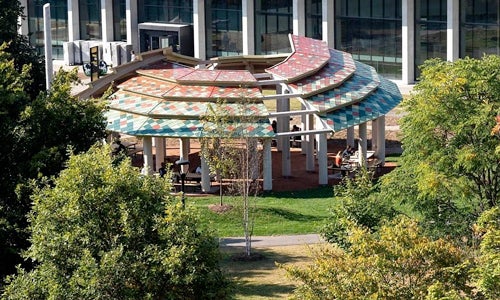
Longhouse Labs
Longhouse Labs (LLabs) builds capacity among Indigenous students and artists while integrating Indigenous knowledge, perspectives, traditions, and leadership broadly within education. LLabs includes a studio and gallery space, an archive, and soon, a garden for land-based learning.
Two Row Path
The main pathway on campus is named Two Row Path, a reference to the Two Row Wampum Belt (Kaswentha) of the Haudenosaunee, believed to be the first and likely the oldest treaty between Europeans and Indigenous Peoples of Turtle Island.
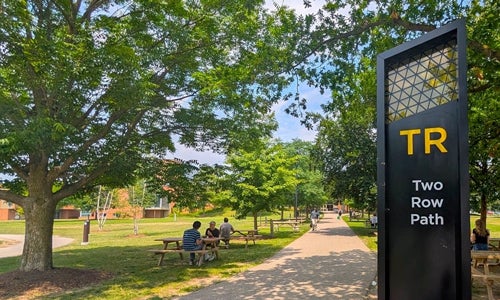
Starting your university journey? Not sure where to start?
Choosing a university for your education can seem like a big task. With so many choices, where do you start? Here are some resources that will help regardless of which university you plan to attend.
Have you studied at college or university?
If you've already completed some college or university, you'll be considered a transfer student and may be eligible for transfer credits. Learn how to apply as a transfer student and about possible transfer credits.
Finding community as an Indigenous student at Waterloo
Adjusting to university can be difficult but with the right support, the transition can become easier. Chemistry student Brae can attest to that.
Devon, an Environment, Resources and Sustainability student, adds that "the Waterloo Indigenous Student Centre created a space for me to be comfortable in."
Read about Devon's and Brae's experiences and how they've become connected to the campus.
Enhance your learning
Many of Waterloo's programs allow you to include a specialization or a minor, which consists of 8 to 10 courses. These minors are available to all Waterloo students. The minors and language courses listed here are taught at United College, which is part of the University of Waterloo and located on our main campus.
Indigenous Studies minor
Through the Indigenous Studies minor, you can deepen your understanding of Indigenous cultures, history, languages, and contemporary challenges. Sample courses include the Indigenous Experience in Canada and Indigenous Rights in Global Context.
Indigenous Entrepreneurship minor
The Indigenous Entrepreneurship minor focuses on the unique needs and priorities of Indigenous entrepreneurs. Available to students in any program at Waterloo or as a stand-alone diploma if you have successfully completed at least one year of college or university. Sample courses include Fundamentals of Indigenous Entrepreneurship and Indigenous Sustainability Entrepreneurship.
Mohawk language (Kanien’kéha) courses
Mohawk language (Kanien’kéha) courses are available to Waterloo students in any program who have minimal to no knowledge of Kanien’kéha.
Ready to learn more?
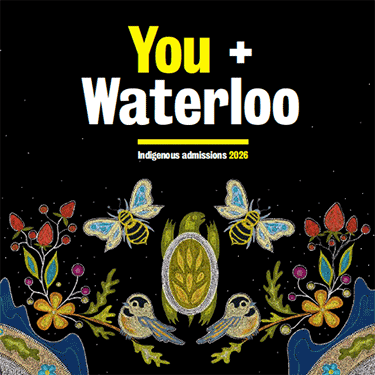
Request a brochure
Request the Indigenous brochure and Waterloo viewbook to learn more about the Waterloo experience.
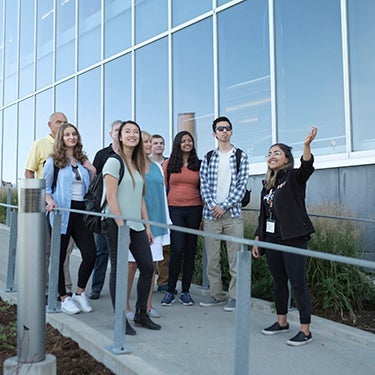
Join us for a tour or event
Explore what the Waterloo campus has to offer!
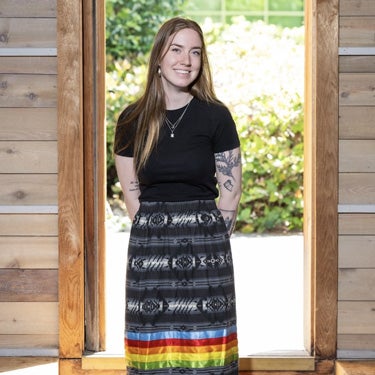
Connect with us
Please email Kylee Smith, Indigenous Recruitment and Partnership Specialist, with any questions or to set up a phone call or a video chat.
Student-written articles
Discover more about Indigenous support and initiatives in these student-written articles.
From the Missing Manual
As an Indigenous student at Waterloo, there are plenty of supports across campus to help you feel welcome. Read our article on finding community as an Indigenous student.